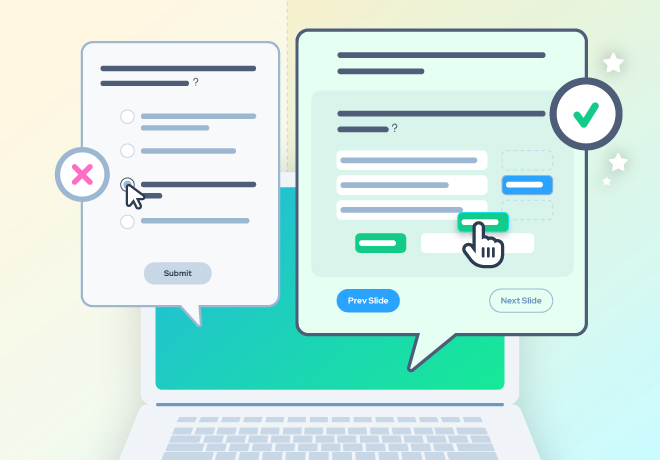
How to prepare yourself before your first call with an LMS sales rep

Related articles
Get valuable eLearning insights to your inbox.
Listen to Neovation’s Demystifying eLearning podcast generated with NotebookLM!
Listen to our podcast on your favorite platform!
You’ve just been asked to take a journey to an unknown destination that will have an impact on every aspect of your business and determine future employee happiness – without a map, a compass, and no visible North Star to guide you.

More specifically, you’ve just been tasked with moving your training online, and your boss wants you to interview and find the best learning management system (LMS) to meet your company’s needs. You’ve done an online search and been overwhelmed by the number of eLearning vendors that are all shouting at you from their digital rooftops that they have the right features to solve your training pain.
But they don’t even know you. And you may not even know what you need. You’ve never done this before, or maybe you’ve had some experience with online training, but you’re afraid your knowledge of what’s available and what’s needed is woefully out of date. Software changes so fast. How can you possibly narrow it down?
Hi, I’m Susan, and I’m your travel agent and tour guide. Take a breath. We’ve got you. My team and I have talked with thousands of people looking for their first LMS (or their next LMS) – from solopreneurs who want to sell their courses to multi-national companies rethinking their team training.
This article will take you through everything you need to know to help narrow down your choices and have meaningful conversations with the handful of shortlisted LMS sales representatives from your preliminary research. We’ll take it step-by-step to help you plan your project and go over:
- What information LMS sales reps will want to know, like your budget, timeline, and estimated number of learners
- How you can pre-qualify vendors before a call
- Customizing your own list of LMS requirements and separating the “nice-to-have” features from the “must-haves”
- The steps to take before jumping into an LMS demo (and after)
- What to do when you find a potential LMS fit
Not every step may apply to you – skip what doesn’t fit your business plan or industry – but generally speaking, here’s a proven road map that will guide you to your destination.
So, you’re moving your employee training online
You’re standing at the crossroads, the intersection of Status Quo Road and Online Training Way, and you’ve made the decision. You’ve done your due diligence and come to the decision that it is now time to move your training online. Maybe this article helped. If you haven’t read “How do I know when it’s time to move my training online,” go give it a read. I’ll wait.
So – back to the crossroads. You’re taking that big first step to finding your first (or next) online training platform. You’ve done an online search and sifted through a number of websites from different LMS vendors to try to get a sense of the landscape you’ll be exploring.
What LMS sales reps will want to know
Before you start emailing or booking meetings, here are a few things you need to consider – as they may help you filter out some of the candidates.
What is your annual budget for a training delivery platform?
Know what that number is both as an annual total and by month – different LMS vendors present their pricing differently. Many post a monthly price, but it is calculated based on one annual payment. Usually, the option to pay monthly adds at least 10% to your total. Make sure you have your top-end budget number firmly in mind.
- Do you have a budget set aside for any possible additional expenses (and you may not even know what those might be) – depending on the vendor, you may be asked to pay for onboarding training, implementation, data integrations, historical data uploads, course development, etc.

How many learners do you anticipate needing to train?
How you train people may depend on your industry, especially if your hiring has to include seasonal surges. When you think about the number of people you want to train, consider the types of training you want to put them through – as that may influence the total number. Also, there are different ways vendors calculate the number of learners in your account – but more on that later.
What types of training are you planning to offer?
This ties to the above number and possibly the features that your LMS needs to have for your training delivery to be successful. Here are some common types of training you may offer:
- Onboarding – for all new employees
- Everboarding – continuing training for your team (content may vary by division, location, role, job title, or responsibility)
- Upskilling – additional training to help some employees navigate career advancement opportunities. These can be hard or soft skills, so you may have someone who is moving into a team leadership position that needs management performance training
- Reskilling – additional training to help some employees improve their performance, retrain for broader responsibilities, or to manage lateral changes in their roles
- Compliance training – if you have employees who must maintain a level of competency that is measured by a regulatory agency, they may need to revisit training topics annually (or in daily drip training if you want to use a microlearning platform)
Do you have course content ready?
Or will you need time to develop your custom eLearning content? Do you have in-house resources who can build online training content, or will you need to hire internal or external resources to build or convert your training content for an online format?
Do you have an immovable timeline?
What timeline are you focused on to get your training implemented and rolled out to your team? Are there other milestone dates along the way? Is the date to spend your allotted budget or a time-dependent deadline for your team to begin or complete training? Your preferred vendor will have to be able to move at the speed that meets your needs.

What internal approvals do you need to make this decision?
Who else needs to be involved as the project moves forward – your boss? The head of Learning and Development (if that isn’t you)? Your Chief Learning Officer (CLO)? Your IT team? Will a contract have to go to your legal or procurement department for review? You’ll need to factor those opinions and approvals into your timeline. Is everyone already on board with this project? Try to have internal alignment with all internal stakeholders to avoid unexpected delays or eleventh-hour project cancellations because a previously unidentified stakeholder puts an end to your LMS dreams.
This may feel like a lot, but your vendors will be asking you questions about all of the above, and the only way to compare apples to apples is to ensure each vendor has the same information to work with – so there can be no ambiguity on their offer, no misunderstanding as to what you are buying, and no buyers’ remorse.
Mutual qualification – checking for baseline “fit”
Your LMS vendor will use your answers to these questions to qualify you as a potential buyer – to help determine if you are a good fit. You can flip the script to pre-qualify vendors before you book a meeting by comparing the information they have on their website with your criteria and excluding any vendors that don’t match your baseline requirements. If your annual training budget is $10K, and a vendor’s first tier of pricing starts at $15K, they may not be in your initial short-list – you’ve disqualified them on price. But that doesn’t mean you may not call them if your first pass through your short-list doesn’t provide you with the quality of vendor you need.
Granny Smith is not a Gala or a MacIntosh
I referenced making an “apples to apples” comparison, but in the same way that there are different kinds of apples, not all LMS platforms are the same. Many will share similar features, but how those features work may not be the same on any two platforms. And even when features are similar, you need to have a solid understanding of the overall capabilities of the platforms you are considering, to make the best decision.
Populating your LMS vendor selection criteria evaluation spreadsheet
At this point, I’m going to assume you’ve got a spreadsheet (or a table) with your baseline requirements (as discussed above) and a list of candidate LMS providers. It might look something like this:

You can add columns for vendor contact info, etc., but you get the idea. You will likely add columns for key features (needs and wants) as you learn more about how various platforms address your needs. You may discover needs you didn’t know you had. However, I would caution you to always separate the “must haves” from the “nice to haves” to ensure you focus on the features that matter. Start thinking about how you will score the various components, so you can measure each vendor’s offering without emotion getting in the way. More on that later.
Above all, I do not recommend going online and downloading someone else’s LMS RFP laundry list of requirements as your must-have list. That list is guaranteed to have requirements that won’t make sense for your business; it may from an entirely different industry sector. I’ve had manufacturers present me with a requirements list that was obviously geared towards higher education, and associations who want to train their members by selling them courses present an RFI that doesn't include eCommerce considerations. By all means, use any of these resources as a baseline – but customize your requirement list to YOUR requirements. A good eLearning provider will help you identify gaps.
The LMS sales process – don’t jump into an LMS demo!
The mutual discovery call process is essential for both you and the vendor to understand what each other needs and determine a good fit. While it may be tempting to jump straight into a product demo, especially if you have some experience in learning management systems and online training, I would strongly encourage you to follow through with the Discovery-Demonstration-Decision process. This initial meeting will almost certainly provide you with deeper insight into the current state of online training and fill in the gaps in your knowledge you may not realize exist. Trust the process – you will make a better decision in the long term.
Every vendor has its own process, but generally speaking, there are a couple of basic steps that every vendor will take you through. Here are the mile-markers on that journey:
- Inquiry
- Initial call
- LMS platform or product demonstration (maybe more than one)
- Confirming alignment and negotiations
- Presenting the proposal
- Procurement with legal
- Closing the sale with signatures
Reaching out to the LMS vendors – how do they handle your inquiry
You’ll reach out, usually by filling out a form on the vendor’s website or sending them an email. You may be asked to provide a lot of information in that sign-up form, or they may just need contact information. The more information they ask for, the more they are pre-qualifying you. Pay attention to how long it takes you to hear back from each vendor and if that response is personal or automated (nothing wrong with automation). Your new best friend, the LMS vendor sales rep, will want to book what we, in product sales, refer to as…
The discovery call with your LMS sales rep – mutual fact-finding to qualify each other
A good discovery call will feel like a conversation with a trusted advisor. This is why it is helpful to have all your baseline numbers I mentioned above at hand. A good LMS sales rep will want to make sure that there is a mutually good fit between your needs and what they offer – and will tell you upfront if there are reasons why their LMS platform is not the right one for you. The last thing a good LMS sales rep wants is a short-term and unhappy client. Listen carefully, and always look for the question behind their question as the conversation moves forward. After all, that’s what they are doing when they listen to your questions and your answers to their questions.

You’re going to cover a lot of ground in that call which is typically an hour long. Depending on your needs, it may take more than one phone call or meeting with your LMS sales rep to cover everything they need. You or they may need to do some research based on the questions you are asked or that you ask – based on your training strategy. This is time well invested. Most clients stay with their LMS for three to five years – so you are building the foundation for a long-term relationship.
Bring all your questions to your discovery call with your LMS sales rep
Each LMS vendor has its own discovery call template to capture the information they need to determine if you are a good fit for their software. Your questions should help determine if they are the right provider. It should be a dialogue. And if more time is needed, book that second call as soon as you can schedule it. Keep the momentum going as you build rapport with your LMS sales rep.
You may ask questions where the answers will be deferred to a subsequent call – your LMS sales rep may need to look into various aspects of their product or service offering to determine how they can best meet your needs. That is totally acceptable. After all, they are just getting to know you and your unique business needs. They may also ask you some questions to confirm their understanding. It’s a conversation, after all. Totally fine.
Both sides should be taking notes – you’re going to be filling in your spreadsheet, maybe adding a few columns. In your first discovery call with your first LMS sales rep, you’ll learn other questions to ask and other requirements you may not have considered. Additionally, you’ll likely learn a bunch of new terminologies to describe what you need your LMS to do. That’s exactly why we built our glossary of eLearning terms – so you can quickly find the meaning to unfamiliar eLearning lingo. What a great learning opportunity!
What do you do when you and an LMS sales rep ‘match’?
If both of you agree that there is potential for a good fit – more than a 50% chance that what they have matches what you need – then it's time to take the next step and book your LMS platform call. You’ll decide who needs to be on the next call (members of your team who will be delivering or creating training, decision makers, IT people, for example), and you’ll book the Main Event.
But what happens If you’ve reached this point and you’re not sure if an LMS is right for your business? Don’t fret! There is still time to revisit your decision.
- Are you unsure which online training platform is best for you? Take a look at our some of our online training concept articles to revisit your requirements for your online training program.
- Still not sure? Our eLearning advisors are just a chat or call away and would happily help you clarify your decision.
Even if you have experience vetting LMS vendors, we hope our advice for your next discussion with an LMS sales rep is helpful. Revisit this article before your next call to keep our tips fresh in your mind. Let’s take the next stage of the journey together. Ready to go to the next step? Read my article, “How do I prepare for my LMS demo.” See you there.

With 15+ years of online marketing and online learning experience, Susan loves to share insights about where these two ROI-building practices can intersect and complement each other for your business or organization.
Become part of our L&D community
We publish a new learning hub article — full of useful, practical topics — weekly.
Not sure where where you want to start? Jump into one of our recently published articles and see where it takes you!








-svg.svg)
-svg.svg)
-svg.svg)
-svg.svg)